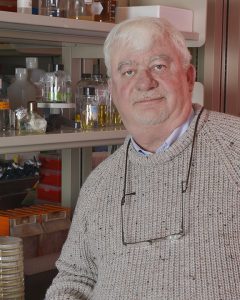
Bill Shafer
Antibiotics have saved millions of lives and prevented serious medical consequences from infections since their introduction in the mid-20th century. Unfortunately, over the years bacteria evolved many ways to counter the action of antibiotics. Presently, in the United States over 23,000 people die each year from an infection caused by bacteria that are resistant to one or more classes of antibiotics.
Bill Shafer, Ph.D. is a Senior Research Career Scientist at the Atlanta VA. His laboratory studies a mechanism of antibiotic resistance that is common to virtually all bacteria. Specifically, this mechanism is based on bacterial pumps that can remove antibiotics from inside the bacteria once they have been absorbed. This reduces antibiotic efficacy enabling bacteria to survive despite antibiotics. These antibiotic-resistant bacteria often over-produce these efflux pumps.
To understand how bacteria over-produce efflux pumps, the Shafer lab studied the sexually transmitted bacteria, Neisseria gonorrhoeae, that causes the disease called gonorrhea. Nearly 750,000 cases of gonorrhea occur each year in the United States. Unfortunately, many infections are caused by strains that are resistant to antibiotics commonly used to treat gonorrhea. The over-production of efflux pumps contributes to Neisseria gonorrhoeae antibiotic resistance. To understand how this happens, the study examined clinical isolates of Neisseria gonorrhoeae that displayed resistance to one or more antibiotic classes. Bacterial genes for efflux pumps were analyzed for mutations that might increase expression of efflux pumps.
The study found that many strains of Neisseria gonorrhoeae that express resistance to antibiotics have a single change (mutation) in their DNA that allows them to over-produce efflux pumps. This finding illustrates how easy it is for bacteria to develop resistance to antibiotics and emphasizes the importance of efflux pumps in antibiotic resistance. Based on this information, the Shafer lab is now exploring new ways to target these efflux pumps to develop better therapies to manage infections with antibiotic resistant bacteria.
Related publication: Rouquette-Loughlin CE, Dhulipala V, Reimche JL, Raterman E, Begum AA, Jerse AE, Shafer WM. 2018. Cis-and trans-acting influence expression of the norM-encoded efflux pump of Neisseria gonorrhoeae and levels of gonococcal susceptibility to substrate antimicrobials. Antimicrob. Agents Chemotherp. 2018 Jun 11. pii: AAC.00821-18. doi: 10.1128/AAC.00821-18.